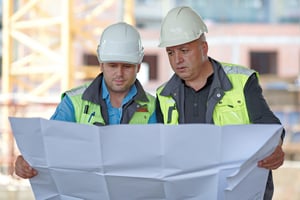 The quality process on construction projects generally consists of Quality Control (owned and executed by the construction contractors) and Quality Assurance (performed by the owner or owner’s representative). As the owner, the one piece of the quality process you have the most control over is Quality Assurance. If you’ve experienced results that were less than what you were hoping for, I suggest taking a closer look at how Quality Assurance is being executed and, more specifically, who is executing it.
The quality process on construction projects generally consists of Quality Control (owned and executed by the construction contractors) and Quality Assurance (performed by the owner or owner’s representative). As the owner, the one piece of the quality process you have the most control over is Quality Assurance. If you’ve experienced results that were less than what you were hoping for, I suggest taking a closer look at how Quality Assurance is being executed and, more specifically, who is executing it.
Your inspectors are where “the rubber meets the road” with Quality Assurance. They’re representing you, ensuring you’re getting what you paid for, and that your projects are being built to your specifications. I like the analogy of an inspector being like a referee. A good referee is one that thoroughly understands the rule book. It’s also important to note that one doesn’t need to have had a long and illustrious career as a professional athlete to be a good referee.
Traditionally inspectors were selected from existing tradespeople. For example, a carpenter might be used as a quality assurance inspector on a large building or an electrician might be selected as the owner’s representative on a substation. This is not necessarily a bad choice, however this philosophy has a few significant drawbacks. One of the obvious drawbacks is the tendency for tradespeople to make assumptions based on past experience performing similar types of work (i.e., “I’ve worked with that type of conduit before - it has to be installed that way”) regardless of what the spec says. Another drawback is the established relationships many tradespeople have with existing contractors and the potential conflict this creates with accurate reporting.
Contrary to conventional wisdom, I believe the best inspector is usually one who brings more technical shrewdness than hands-on experience. For example, inspectors with engineering/tech backgrounds are very good at comparing complicated drawings with the work being performed and picking out any discrepancies. That’s because their lack of direct experience requires them to dig deeply into project documents and specifications to understand the work that needs to occur. It may seem counterintuitive, but their lack of trade-specific experience means they’re far more likely to ask questions rather than make assumptions.
The largest benefit in an inspector who is technically savvy is having someone who is extremely capable with integrating computers and available technology to the inspection process. Today’s inspection tools include cameras, laptop computers, smart-phones, and even drones; photos, imaging, tracking spreadsheets, and other forms of documentation are almost exclusively electronic nowadays because electronic documentation is so much more efficient to share and archive. Today’s Quality Assurance report is in your inbox before the crews have gone home for the night.
Quality Assurance inspectors should have a solid technical foundation combined with a thorough understanding of the rule book (job specifications, prints, drawings, etc.). Like referees, good inspectors know how to interpret that rule book so that when they call a foul they’re confident the call is fair.
Overall project quality is the result of firm and fair inspection practices combined with rock solid, extensive documentation and a partnership between contractor, owner, and inspector. In my experience these results are usually best delivered by an inspector with a technical background. While technical skill, rigor around plans and specs, and computer skills aren't necessarily exclusive to those with a technical background, it pays to confirm these qualities are embodied by your inspector, regardless of their previous background.
What do you think? Have you had better results with inspectors who are tradespeople or inspectors who come from a technical background? I’m interested in hearing your thoughts, so please leave a comment below.
Image credit: © Can Stock Photo Inc. / ilkercelik

